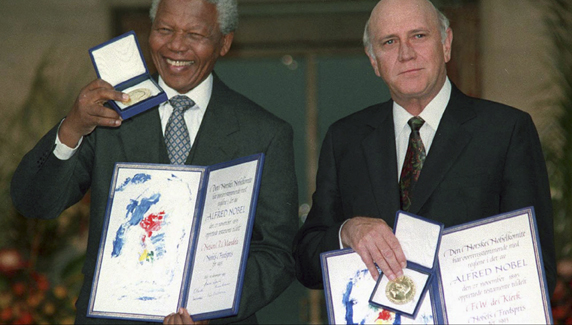
Nelson Mandela and F.W. de Klerk pose with their Nobel Peace Prize medal and diploma (First Run Features)
Nelson Mandela is likely one of the most famous and admired figures of the 20th century. His story is well-known. After 27 years as a political prisoner, he became the first democratically elected president of South Africa. He orchestrated a peaceful transition out of the apartheid system, when catastrophic violence seemed inevitable. For this, Mandela was the co-winner of the 1993 Nobel Peace Prize. But who let him out of prison? And who got to share the award?
The other recipient is F.W. de Klerk, the last president of the old South Africa, and one of the most complex modern world leaders. As this documentary makes clear, de Klerk made the unique move of negotiating the end of his own political system. It is no small thing for a leader of a country to publicly admit that its entire political system is immoral and to take action to dismantle it. The film puts forth a good case that de Klerk has not gotten as much credit as he should have.
One of the fascinating things about the film is the perspective of de Klerk’s African National Party about apartheid. The party claimed not to believe that black South Africans were racially inferior but that they were at a lower developmental stage. It felt it would have been unfeasible to have two groups of drastically different advancement coexisting in one state, so the policy of “separate development” was instituted.
Of course, this is rubbish, but it underlines the philosophy that was ingrained in de Klerk. His father was a far-right politician and one of the major architects of the apartheid system, serving in a myriad of political capacities, such as president, minister of several departments, a senator, and the president of the senate. F. W.’s older brother was a radical anti-apartheid leftist, and he had some influence on his brother’s thinking, but F.W.’s background and early development was fairly conservative.
The filmmakers point out that the progressive tide of world events in the late 1980s was the catalyst for de Klerk’s eventual radical actions. In many ways, the real beginning of the end of apartheid was the 1986 Comprehensive Anti-Apartheid Act passed by the U.S. Congress. Perhaps unsurprisingly, President Reagan vetoed the act, but it still managed to pass. The sanctions crippled South Africa’s economy and would not be lifted until concrete steps were taken to dismantle the unjust system. Combined with major events such as the fall of the Berlin Wall, de Klerk realized that the world was changing and he had to drag his troubled country into the modern era. Without these outside events and pressures, it’s possible that de Klerk still would have felt a personal moral imperative to end apartheid, but not certain.
The portrait that emerges from The Other Man: F.W. de Klerk and the End of Apartheid is of a fundamentally decent man who is perhaps cautious and pragmatic to a fault, not unlike Franklin D. Roosevelt. F.D.R. was no great friend of the young civil rights movement of the 1930s and 1940s, but he was open to listening to its ideas, which was a step in the right direction.
The documentary is filled with remarkable little stories. De Klerk discusses his clandestine meeting with Mandela, before deciding to release him. He describes how they sized each other up and concluded that they could reason with one another. Particularly compelling is footage of the 1990 parliamentary session where de Klerk lifts the ban on the African National Congress and other leftist political parties, freeing Nelson Mandela and other leaders in the anti-apartheid movement. The decision does not go over well with many parliament members, their indignant outbursts fill the hall.
The film’s last quarter or so turns surprisingly critical of its subject, so much so that it’s somewhat amazing de Klerk agreed to give the filmmakers so much access. During the period of transition in the 1990s, state security forces responsible for enforcing apartheid policies committed atrocities. He never had a good relationship with the security forces, as de Klerk was far more liberal, and he claimed not to have known about the thousands of killings they were responsible for. Skeptical viewers may think he’s just trying to save face, but if he’s lying, he’s a very good liar.
The film raises moral questions without any easy answers. Informative, provocative, and unsettling, The Other Man is highly recommended for anyone interested in history, justice, and complex moral figures.
















Leave A Comment